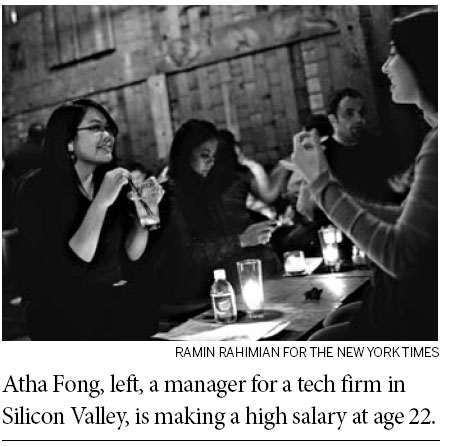Dreams of success in Silicon Valley
Updated: 2012-02-19 08:36
By Erica Goode(The New York Times)
|
|||||||

SAN FRANCISCO - Atha Fong, 22, has trouble explaining to her mother exactly what she does as a product manager at iSkoot.
"Basically, her understanding is that I work with engineers to make mobile phone applications, but more than that, not really," she said.
Her more than $70,000 salary, stock options and personal investment portfolio, though, go a long way to alleviate any parental concerns.
Ivan Lee, 25, turned down a lucrative offer from Microsoft to start his own company, developing location-based games that he hopes will eventually dominate the industry. Bansi Shah, 23, picked up her undergraduate diploma, then took a job at Lattice Engines, a small San Mateo startup, where she makes "near the top" of the company's $80,000 to $130,000 range for an entry level product manager, plus equity.
These are the latest high-tech migrants to Silicon Valley, in their 20s and fresh out of college, drawn by a surge in start-ups and investment money that in the last year and a half has created more jobs than companies can fill, and eager to help shape the technology that infuses their lives.
These recent college graduates are, at least for the moment, snugly protected from any hint of the global recession.
"We've always had this gravitational pull," said Julie Hanna, a serial entrepreneur who sits on the boards of a number of successful companies, "and then on top of that, we have the economic contrast, because the rest of the country looks like a desert and here money is flowing freely."
Boom and bust cycles are endemic to Silicon Valley, where many older denizens have vivid memories of the giddy highs of the 1990s and the desperate lows that followed. But buoyed by the frenzy of entrepreneurship around them, many young newcomers exhibit an optimism and confidence no economist could dampen. To some who have watched successive generations land here, this latest crop seems brash and entitled, with short attention spans. Others see in them a social conscience and maturity that set them apart from the high-tech gold diggers of the 1990s.
Still emerging from their student years, most have yet to translate their earnings into material tokens of success. In San Francisco's expensive housing market, they tend to rent rather than own, often sharing quarters. They drive Hondas and Fords and maybe a Mini Cooper or two. In the tradition of start-ups here, they dress in jeans and other casual attire.
The temples of the valley - Facebook, Google, Twitter, Zynga - loom large in their conversation. Some have already founded companies; nearly all have toyed with the idea. "It's always at the back of my mind," said Danny Schauffer, who landed a job at Facebook after college.
Many started fending off job offers even before graduation, besieged by recruiters desperate to fill slots at established companies and start-ups, which at the last count numbered about 23,000, according to Russell Hancock, chief executive of Joint Venture, a company that analyzes Silicon Valley trends.
Computer engineers, in high demand but short supply, can command six-figure salaries right out of college, augmented by signing bonuses and equity or stock options.
But technical skills are not essential. The rise of social media has drawn graduates in history, psychology or music, and a slowly growing number of women and minorities.
Entrepreneurship is still the elixir of the valley. Anyone with an idea and a few hundred dollars can take a chance.
"I might be losing two years of salary, but no risk, no reward," said Mr. Lee, who still receives regular queries from recruiters at Facebook and Google but pays himself $2,000 a month and shares a house with co-workers at Loki Studios, the company he founded.
"It's a nice dream to have: If I didn't have to answer to anybody, if I could run my own company," he said. "Everyone has a friend who was at a start-up and made their own fortune, and everybody is curious if they could do it, too."
Randy Komisar, a venture capitalist and serial entrepreneur, says the cavalier attitude of some young entrepreneurs worries him. "I think there's something as too much self-esteem," Mr. Komisar said. "Everybody is doing their app, and everybody is doing a start-up, and everybody has raised a million dollars."
Most, he said, "have no clue how to connect the dots" to create a sturdy, long-term product.
"My guess is that at some point the music stops and we find out that there's not just one less chair but hundreds of thousands of less chairs, and we'll have thousands of kids who haven't learned anything because they're all expecting to learn from each other," he said.
The New York Times
(China Daily 02/19/2012 page10)